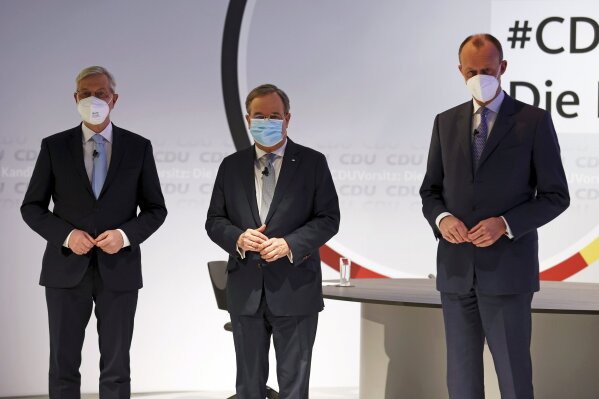Germany: race for Merkel party leadership goes to runoff
BERLIN (AP) — Conservative Friedrich Merz and pragmatic state governor Armin Laschet advanced to a runoff vote Saturday for the leadership of German Chancellor Angela Merkels’s party, eight months before voters decide who will succeed Merkel in a national election.
The new leader of the center-right Christian Democratic Union will either run for chancellor in the Sept. 26 parliamentary election or have a big say in who does run.
There had been no clear favorite going into Saturday’s vote at an online convention of the CDU. A first round of voting among some 1,000 delegates produced a virtual tie between Merz and Laschet, with neither winning a majority.
Merz, 65, is a one-time rival of Merkel who stands for a more conservative course but lacks government experience. He is making his second attempt to win the party leadership after a decade away from front-line politics, following his narrow loss in 2018 to outgoing leader Annegret Kramp-Karrenbauer.
Merz told delegates that, when he joined the CDU at 16, “I didn’t go into a placement agency for government jobs; I went into a party that has principles, that fought passionately for its politics ... always carried by the idea that there are no left-wing majorities in this country.”
Laschet, 59, is the governor of Germany’s most populous state, North Rhine-Westphalia — a traditional center-left stronghold where he won election in 2017. He is viewed as more in line with Merkel’s pragmatic centrism, and pointed Saturday to the value of continuity and moderation.
“We must speak clearly but not polarize,” he told delegates. “We must be able to integrate, hold society together.”
Laschet said that “there are many people who find Angela Merkel good and only after that the CDU. He added that ”we need this trust now as a party” and that “we must work for this trust.”
Merz won 385 votes and Laschet 380 in the first round of voting. A third candidate, Norbert Roettgen, was eliminated with 224 votes.
After the runoff vote, Saturday’s winner will be officially endorsed in a postal ballot — which is expected to be a formality but is required by German law.
Saturday’s decision will end an 11-month leadership limbo in the CDU after Kramp-Karrenbauer, who had failed to impose her authority on the party, announced her resignation. A vote on her successor was delayed twice because of the coronavirus pandemic.
It won’t be the final word on who runs to succeed Merkel as chancellor. The CDU is part of the Union bloc along with the Bavaria-only Christian Social Union, and the two parties will decide together on the center-right candidate. The Union currently has a healthy poll lead, helped by positive reviews of Merkel’s handling of the pandemic.
CSU leader Markus Soeder, the governor of Bavaria, is widely considered a potential candidate after gaining in political stature during the pandemic. Some also consider Health Minister Jens Spahn, running to be the deputy CDU leader under Laschet, a possible contender.
Merkel, who has been chancellor since 2005, announced in late 2018 that she wouldn’t seek a fifth term. She also stepped down from the CDU leadership.






